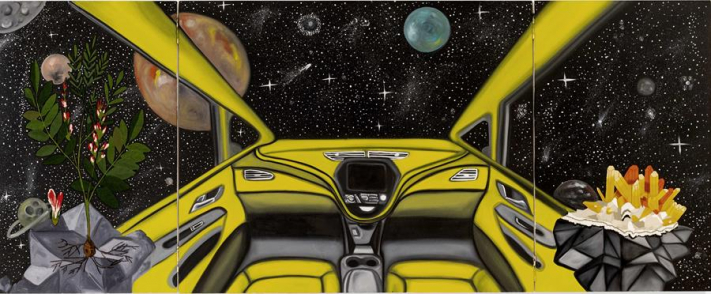I don’t know about the rest of you, but I’ve been feeling a bit apocalyptic of late. When it’s clearer than ever that Western powers’ coffers are apparently big enough to fund genocidal war crimes and billionaires’ vanity ventures but not to feed or house its citizens, it’s been hard to conceive a vision of the future that isn’t resolutely bleak. How grateful I am, then, to Frieda Toranzo Jaeger, whose first UK solo show A future in the light of darkness reignites revolutionary hope like a shot of adrenaline to the heart. Her boldly imaginative reappropriations of both art history touchstones and contemporary technology is speculative in the best possible way, creating a visual dialogue that pulses with potential energy.
I use “pulses” deliberately here because a motif you’ll find recurring across the exhibition space is that of the heart, most prominently in an enormous hanging installation as you enter the main gallery. Open your heart because everything will change encapsulates much of what preoccupies Toranzo Jaeger’s body of work: a marrying of the mechanic and somatic. Vascular systems that call to mind both arteries and circuit boards; the painted surface laced with wire mesh and corseted with embroidery invoking the play of queerness and kink. Toranzo Jaeger draws from 15th century devotional altarpieces in the segmented, articulated structure of her sculptural pieces, and in doing so encourages us to reimagine a different, decolonised and altogether queerer kind of devotion.
There’s a striking rebuke of prevailing cultural narratives at play here. Both the futuristic technologies and the artistic canon we are taught to revere are intertwined with the tools of oppression, and Toranzo Jaeger acknowledges this context in remarkably transformative ways. Drop Out Tradition, which sees a section of a piece by Diego Rivera transferred to a modern day car interior, rejects the reductive paternalism both of Rivera towards his subjects and of Western art history towards Mexican artistic tradition in general.
We see that irreverence again in End of Capitalism, the Fountain; a satirical homage to Lucas Cranach’s The Fountain of Youth (1546), her piece has no preoccupation with a misogynist ideal of recapturing youth and beauty. Her figures cavort without any desire for conversion, a queer utopia formed in the repurposed wreckage of aircraft and satellites; rendered in the traditional pre-Columbian embroidery that is a staple of Toranzo Jaeger’s pieces, they leap from the canvas with unapologetic vividity. Her use of the technique across the pieces on display is incredibly effective - like the utopias she envisions, it’s a generative disruption, pushing through the tradition of paint and canvas like a flower poking through asphalt.
But it goes beyond mere pastiche; Toranzo Jaeger’s vision is intergalactic. Space travel is an object of fascination throughout - in more than one piece we are placed behind the wheel of a spacecraft control panel, gazing into the starry expanse. But that imagining of the final frontier is placed in conversation with art history. Iconic artworks populate each panel screen; Cranach’s Adam and Eve, now Eve and Eve, are set into the circuitry. Different centuries’ conceptions of enlightenment and progress commingle, inviting us to question the implications and limits of each.
What’s refreshing about Toranzo Jaeger’s work, though, is that while there is critique, it is not doomerist. Technological advancement is not, in and of itself, an evil; this is not a surface level parable of ‘what if phones, but too much?’. Indeed, there is an arresting beauty in her interplay between the natural world and mechanisation (her ‘Four Seasons’ installations of motorised, intricately decorated floral pyramids is a particular standout in this respect, rigged to ‘bloom’ and close like flowers). It is where that technology is hoarded for the benefit of profit rather than the collective good that things get thorny, seen most overtly in Deep Audi Aicon 2020 costume design by H. Memling, in which fragments of Memling’s Last Judgment can be seen only in the rearview mirrors of a self-driving car. But Toranzo Jaeger’s rendering of space travel itself is often unambiguously vibrant and lovingly captured, planets and constellations painstakingly embroidered.
What it put me in mind of, oddly, was Star Trek. There’s a running internet gag that the voyagers of the Starship Enterprise enjoy a kind of ‘fully automated post-scarcity space communism’, but it’s honestly not inaccurate. Star Trek’s creator (and avowed socialist) Gene Roddenberry shook off the Cold War posturing of space travel’s origins to envision a classless, moneyless future where automation grants unlimited freedom to explore the depths of space and one’s own imagination, a philosophy which allowed the show to routinely break boundaries in contemporary representation. How did we go from this kitschy, joyful vision of things to come to the white, sterile future of the 21st century’s collective imagination? Contemporary space travel retains the imperialist/capitalist flavour of its beginnings, invitations extended only to the billionaire class - Toranzo Jaeger’s space flight, conversely, is riotous with colour, plant life and crystals sprouting from the control panel, rhinestone stars twinkling in the cosmic distance.
James Baldwin once observed that the cultural notion of civilization “lives, first of all, in the mind…[t]here is reason, after all, that some people wish to colonize the moon, and others dance before it as an ancient friend.” Toranzo Jaeger expands on this concept, often playfully but always consciously. It is possible to kill the space coloniser in your head, to shoot for the moon without the impulse to plant a flag on its surface. But to do so requires a radical disassembly of the power structures behind what we prize - art and technology for the many, not the few. Revolution is near impossible without imagination, a vision of what the world could be in spite of what it is. And if you’re feeling out of ideas, A future in the light of darkness is a very good place to start.




